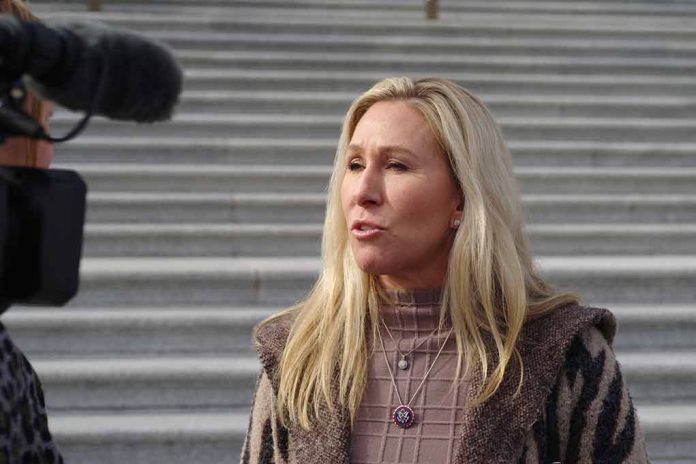
Rep. Marjorie Taylor Greene retracts false claims about ABC News whistleblower’s death, revealing it as an AI-generated hoax.
At a Glance
- Greene spread a false story about an ABC News whistleblower dying in a car crash
- The claim suggested a link to Vice President Kamala Harris’s campaign
- Greene retracted the statement after it went viral, admitting it was an AI-generated hoax
- ABC News denied allegations that Harris received debate questions in advance
Greene’s False Claim and Rapid Spread
Georgia Republican Rep. Marjorie Taylor Greene found herself at the center of controversy after spreading an unfounded claim about the death of an alleged ABC News whistleblower. The congresswoman’s post on X (formerly Twitter) suggested a connection between the supposed whistleblower’s death and Vice President Kamala Harris’s campaign, citing vague “news reports” as the source of information.
“The ABC whistleblower who claimed Kamala Harris was given debate questions ahead of the debate has died in a car crash according to news reports,” Greene stated in her initial post.
The unfounded claim quickly gained traction, receiving approximately 9,000 retweets within just three hours. The rapid spread of this misinformation highlights the speed at which unverified claims can circulate in today’s digital landscape, especially when shared by public figures with large followings.
The Origin of the Hoax
As the story unfolded, it became clear that the source of this false information was not credible news outlets, but rather an AI-generated website known for spreading malicious content. Even The Gateway Pundit, a site often associated with conspiracy theories, warned its readers about the fraudulent nature of the story.
“WARNING: This website is contaminated with a virus!” The Gateway Pundit wrote on Sunday. “It’s clear to us that this is a complete hoax.”
The only report found was from an unreliable source called “CountyLocalNews.com,” which lacked credibility and a byline. This incident serves as a stark reminder of the importance of verifying information before sharing, especially for public officials with significant influence.
Greene’s Retraction and Aftermath
Facing mounting evidence that the story was fabricated, Greene retracted her claim after it had already gained significant attention. In a follow-up post, she acknowledged the falsehood of the information but maintained her stance on the need for an investigation into the original whistleblower allegations.
“This story appears to be false and I’m glad to hear it. We need a serious investigation into the whistleblower’s report that Kamala Harris was given debate questions ahead of time from ABC!” Greene stated in her retraction.
Despite retracting the claim, Greene did not delete her original post, allowing the misinformation to remain visible to her followers. This decision raised questions about the responsibility of public figures in managing the spread of false information on social media platforms.
ABC News Denies Allegations
In response to the circulating rumors, ABC News firmly denied any wrongdoing or favoritism towards Vice President Harris. The network rejected claims that Harris had been given debate questions in advance, emphasizing the integrity of their debate process.
This incident underscores the ongoing challenges faced by news organizations in combating misinformation and maintaining public trust. It also highlights the need for increased media literacy and critical thinking skills among the general public to discern credible information from fabricated stories.
Lessons Learned
The rapid spread and subsequent retraction of this false story serve as a cautionary tale about the power and pitfalls of social media in the current political landscape. It emphasizes the importance of fact-checking and responsible information sharing, particularly for those in positions of public influence.
As AI-generated content becomes more sophisticated and prevalent, the incident also highlights the growing challenge of distinguishing between authentic and fabricated information online. This case serves as a reminder for both public figures and citizens to exercise caution and verify sources before amplifying claims, especially those of a sensitive or controversial nature.







